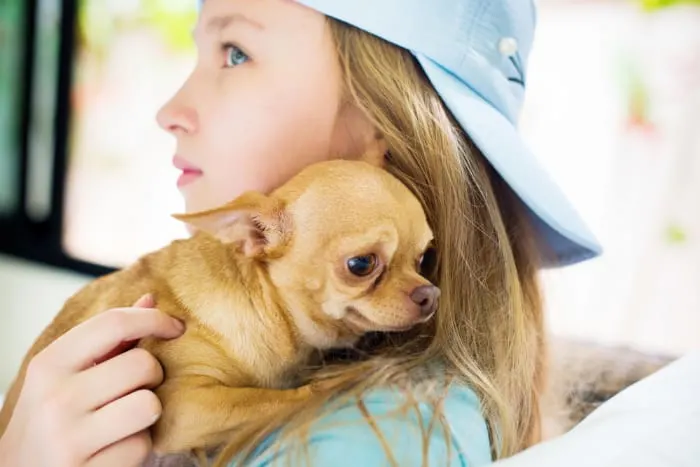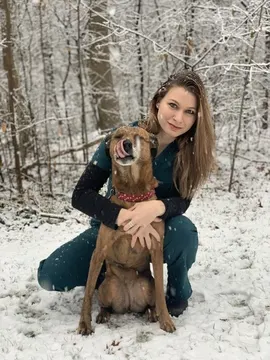
When your dog starts to exhibit unusual behavior or seems under the weather, you may wonder if there is something wrong with him or her.
It is useful to know what to look out for regarding to your dog’s health. Then you can figure out whether you are overly concerned or have a legitimate reason to rush your pup off to the vet’s office!

Take your dog to the vet if:
- They vomit and/or have diarrhea for more than a day. Repeated vomiting or large volume diarrhea is never a good sign. Keep a sharp eye out and take them sooner if they show signs of dehydration such as dry, sunken eyes and dry nose and gums, loss of skin elasticity, panting, and thick saliva. This over means your dog is severely dehydrated.
- Bloody diarrhea or vomiting blood. Take them to the vet immediately.
- Your dog is in obvious pain.
- Your dog is bloated or his abdomen is hard and swollen.
- Your dog is excessively thirsty.
- Your dog has a seizure and has not been treated in the past for them. If they have seen a doctor before about it, still let your vet know that it has happened again. Any seizures lasting longer than 5 minutes, or 2 seizures in <24 hours is a medical emergency.
- Sudden weight loss.
- Their eyes are cloudy, swollen or red.
- Your dog stops eating.
- Your dog’s poop looks different than normal (is tar-black, or reddish).
Chihuahuas, especially purebred ones, are prone to some medical issues. Some of them can be serious, but others are not a huge cause for concern.
Click to see the most common chihuahua health problems.
An exceptionally common issue that chihuahuas can have is known as reverse sneezing.
The dog goes into a fit of snorting or sucking in air, that can last for many seconds. The first time this happens, many chihuahua parents panic.
It seems as if the dog is trying very hard to inhale/clear its nose. However, this is not the case. Chihuahuas reverse sneeze because of an anatomical flaw that many of them have in their soft palates.
Sometimes reverse sneezing fits come on randomly; at other times, it may be triggered by something like the dog getting overexcited.
It’s kind of like how humans get the hiccups! They are uncomfortable but far from life-threatening!
In general, do not be afraid if your chihuahua starts reverse sneezing. You should worry if your dog starts having lengthy wheezing fits. If they last longer than a minute, that is when you should see a vet.
This video will let you hear the difference in the types of noises your dog may make:
The dog may have a more serious breathing problem such as a collapsing trachea. A collapsing trachea means that the cartilage that lines the windpipe is collapsing, making it difficult for air to get to the dog’s lungs. This often appears as a honking or goose sounding cough.
Collapsing tracheas can be treated with medication or surgery. Weight loss is beneficial too.
It is normal for your dog to have a low-energy day occasionally. Humans feel tired sometimes too, after all! However, if your dog seems to be very fatigued for a long period of time and does not show interest in her usual activities, you should consider a vet visit.
Excessive tiredness, especially if it is accompanied by bloating or trouble breathing, can be a sign of illness in chihuahuas. Chihuahuas are prone to heart problems, and these can be early signs.
If your dog’s energy seems to be decreasing over time, it might be time to see a vet.
For example, a dog that starts to give up in the middle of walks on familiar routes may be experiencing abnormal levels of fatigue. If the dog faints, go to the vet immediately. These are signs of heart issues.

Common heart problems in chihuahuas include pulmonary stenosis and mitral valve disease. These illnesses are very serious but are often treatable! The vet can prescribe medication or perform surgery that will allow the dog to live a normal, healthy life.
Another common problem among young chihuahuas is hypoglycemia. The symptoms of this include fatigue, unsteadiness on the feet, glazed-over eyes, and fainting.
If your dog shows any of these symptoms, it is time to consult the vet. Hypoglycemia can be extremely serious, but it is also typically treatable. Vets typically run blood tests to diagnose hypoglycemia. If the dog is truly hypoglycemic, the treatment consists of intravenous fluids with added sugar and dietary interventions.
Most chihuahuas are born with a soft area on their heads. This is called a molera and is completely normal and usually, but not always goes away (my Lucy still has it).

However, chihuahuas can also have a health problem called hydrocephalus. Hydrocephalus means that there are too many fluids in the skull. These fluids put pressure on the brain and can cause developmental problems and epilepsy.
It is important to diagnose hydrocephalus in puppies so that a veterinary neurologist can provide interventions as needed.
It is important to distinguish between a molera (normal) and hydrocephalus (abnormal).
A molera is a little hole inside the dog’s skull. That part of the chihuahua’s head feels soft to the touch. Hydrocephalus usually looks like a swelling or an abnormally large dome shape on the dog’s head. However, hydrocephalus can also give the impression of multiple moleras or an unusually large molera. They may recommend referral to a neurologist.
If you think your dog might have multiple “holes” in her skull or seems to have a very large hole, bring it up to the vet. The vet may be able to investigate further and determine if the chihuahua has hydrocephalus or a normal molera.
An extremely common problem that chihuahuas and other small dogs have is patella luxation. This is a fancy term that means that the dog’s kneecap has slipped out of place.
If you notice your dog limping a lot and having difficulty using her hind legs, it is time to go to the vet.
Patella luxation can be minor, so sometimes no intervention is necessary. However, some dogs require surgical intervention. It is always a good idea to consult a vet on the best course of action.

It is unfortunate that our little canine companions can have health problems! But now you know what to watch out for, and maybe you feel more prepared to handle various situations.
Remember that even many of the more serious medical conditions are fully treatable. In addition, as fragile as chihuahuas might seem, their life expectancy is much longer than that of other dogs!
May your dog have many more years of good health and happiness.


Paula Simons
DVM
This article has been reviewed, fact-checked, and approved by Dr. Paula Simons DVM. You can read more about her on our About page.

Greta James
Tuesday 2nd of June 2020
Thank you for informing me that bloating and tiredness are signs of heart problems in chihuahuas. About a week ago, I was talking with my sister, who just adopted a chihuahua. She wants to make sure that she can take good care of her little guy. I will have to tell her about your article and help her look into animal hospitals in the area that could help if needed.
Cathy
Tuesday 2nd of June 2020
Your'e welcome Greta. Hope your little "nephew" pup is healthy.
Patricia BOSTON
Sunday 25th of August 2019
This reply is not to do with health its about putting my chi in kennels for the first time. He is 8 months old I'm going away for 5 days and putting him in kennels is unavoidable I'm so upset I feel I'm betraying him I've put toys his own bedding food and a t shirt I have worn I felt terrible when I left him still do regards Pat Boston
Cathy
Sunday 25th of August 2019
I understand your feelings Pat. I'm lucky enough to have a lot of family members around to care for my fur babies when I'm out of town. I think if I had to use a service, I'd get a pet sitter so at least my dogs and sugar gliders would be in their own home. I have worked in several kennels and though it can be somewhat traumatic for the dogs (depending on the dog's personality) all the people I worked with were animal lovers and were very kind to the dogs. The good news is our pets are very forgiving and won't hold it against you. They may be a little clingy for a day or two when you get home but that's totally normal.
Maryann Orlando
Saturday 24th of August 2019
My 11yr old had swelling on her head then we say blood cover her head vet sent us to a surgeon and was told her heart problems she may not make it a year later she went bind and had ear problems then she couldn’t chew her food she slept a lot and I had to hand feed her .for two nires she coughed all nites took her to the vet said it was her heart it’s time for her because she is in pain so we made the discussion to say goodbye after taking god care of her we had to lose her
Cathy
Saturday 24th of August 2019
That's heartbreaking Maryann. I'm so sorry you had to lose your little fur baby. It sounds like you made the right decision for her though.
Terry
Friday 23rd of August 2019
I have problems with fleas on my chi. I've tried Frontline and it doesn't work.
Cathy
Saturday 24th of August 2019
Are you treating your home and yard at the same time? We have some articles on fleas that might give you some ideas what to do: https://ilovemychi.com/tips-for-dealing-with-fleas-on-dogs/ https://ilovemychi.com/how-to-get-rid-of-fleas/ https://ilovemychi.com/fleas-ticks-and-other-nasties/ https://ilovemychi.com/smart-easy-ways-to-protect-your-chihuahua-from-pests/
Margaret Becker
Friday 23rd of August 2019
Thank you for all the info!
Cathy
Friday 23rd of August 2019
You're welcome Margaret!